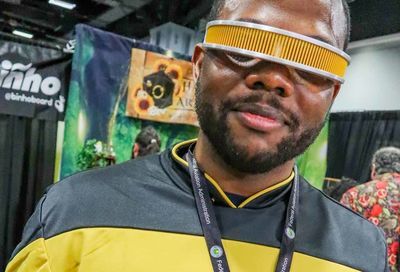Icelandic Surprise
Jónsi's solo debut surprises for its fiery music with pop power, while Bitch refines her theatrical punk approach
How is the singer-songwriter Jon Thor ”Jónsi” Birgisson similar to the Icelandic volcano that shut down air traffic in Europe for days on end last month? In a word, surprise. Before its eruption, few knew volcanic ash could have that much far-reaching power. And before this solo set, few knew the gay lead singer and guitarist for Sigur Ros could — or at least would — churn out fiery music with immediate pop power.

jónsi
(Photo by Lilja and Inga Birgisdóttir)
The 35-year-old Jónsi launches Go with the same giddy sense of joy and wonder you may remember from your first carnival — or better, your first big pride festival. A marching band parades down a sunny street to the tune of the impossibly bright and bouncy ”Go Do,” as you try to remember life before — as well as anticipate what’s next. How soon can you feel this good again?
This is certainly not anything you could have expected from the ambient rocker with the ethereal, even elfin countertenor voice and penchant for making dazzling, sprawling music with a gloomy, cloudy sheen. Jónsi’s band Sigur Ros, after all, is widely acclaimed for making pretty but fuzzy, atmospheric music that slowly shifts and twists — the sound, say, of volcanic particles floating in the air over western Europe. Go, on the other hand, is much clearer and less mysterious, moving at a brisker clip. It’s not the sound of lava, exactly — it never spews out unrefined, or destroys anything with its heat and beauty. But we’ve definitely moved closer to the source.
”Wild be my boy, you burn so bright, till you illuminate,” he sings on the chirpy ”Boy Lilikoi”: ”One day you’re out, you give up the fight, you slow down heart rate.” Is he singing about a firefly? Well, the eccentric lyrics match the almost cacophonous symphony, of woodwinds, strings and digital manipulations. The orchestration is one manifestation of his collaborating here with gay experimental composer Nico Muhly, the Philip Glass protégé who has previously worked with Bjork and Antony and the Johnsons, among others. Jónsi also worked with his American boyfriend Alex Somers.
Most of the songs on Go seem inspired by animals and sentient beings. ”We should all be, oh-oh-oh, alive,” Jónsi sings on the speedy ”Animal Arithmetic,” which features the sound effects, among many other things, of a herd of animals and a braying elephant. Giddy up!
Go is also not as lyrically abstract as Jónsi’s work in Sigur Ros. Obviously, the fact that he sings mostly in English helps. He leaves behind the gibberish language Hopelandic that he made up for a number of Sigur Ros recordings. And his native Icelandic, a language spoken by just some 320,000 people around the world, only factors into two songs.
Still, though, much remains indecipherable anyway. Jónsi often lodges his pixie-sized voice in, or flutters it around, his high register, and he stutters, elongates and emphasizes syllables in unusual ways. ”We should al-ll-ll-ll-ways, know that we, can-nn do anything,” he sings on ”Go Do.”
Jónsi does offer a glimpse or two of the traditional moody Sigur Ros style here and there. The Icelandic song ”Kolniður” sounds submerged — and as if it’s still sinking. Later comes the set’s final two tracks, ”Grow Till Tall” and ”Hengilás,” both pensive and cinematic — and a bit lacking in color and character, at least relative to the revelry that precedes them.
The mournful, Moby-esque pop song ”Tornado” somewhat splits the difference between boom and gloom. The song compares natural occurrences, including tornadoes and volcanic eruptions, to human behavior, especially the self-destructive kind. ”You grow, you grow like a tornado,” Jónsi sings. ”Destroy from the inside.”
But Jónsi has grown without destroying anything. How will he surprise us next?
The singer-songwriter known only by the recording handle Bitch also has a surprise in store with her second solo album, Blasted! Fueled by a breakup, the album bristles with passion and intensity, both melodically and lyrically. The lesbian artist has further honed the ”theatrical punk” sound she started out making in the late ’90s as the lead half of the queer duo Bitch and Animal, part of Ani DiFranco’s musical family. Now, fou r years after her debut Make This/Break This — and after a star turn in John Cameron Mitchell’s Shortbus — Bitch has self-released and self-produced a hard-charging but sweet set that deserves wider attention.
Go
XL Recordings
$14.98




Bitch
Blasted!
Short Story Records
$15.98




”The whole sky’s about to open up, and so am I,” she sings on the simmering rocker ”Open Up.” Bitch offers some cute and clever wordplay throughout Blasted!, though as always the most distinctive feature is the musical instrumentation. Bitch plays a mean electric violin — aside from her talky singing voice, it is her main instrument, though she also plays bass and ukulele at points here. It turns out, the electric violin is a wise stylistic choice: Even at her most ferocious bowing (first single ”Kitchen,” ”Bugs”) the sound the instrument produces is more elegant and reflective — resonant — than had she strummed an electric guitar. The bittersweet strings help you feel the immediate pain but also the emerging beauty as Bitch builds from her breakup.
Support Metro Weekly’s Journalism
These are challenging times for news organizations. And yet it’s crucial we stay active and provide vital resources and information to both our local readers and the world. So won’t you please take a moment and consider supporting Metro Weekly with a membership? For as little as $5 a month, you can help ensure Metro Weekly magazine and MetroWeekly.com remain free, viable resources as we provide the best, most diverse, culturally-resonant LGBTQ coverage in both the D.C. region and around the world. Memberships come with exclusive perks and discounts, your own personal digital delivery of each week’s magazine (and an archive), access to our Member's Lounge when it launches this fall, and exclusive members-only items like Metro Weekly Membership Mugs and Tote Bags! Check out all our membership levels here and please join us today!





















